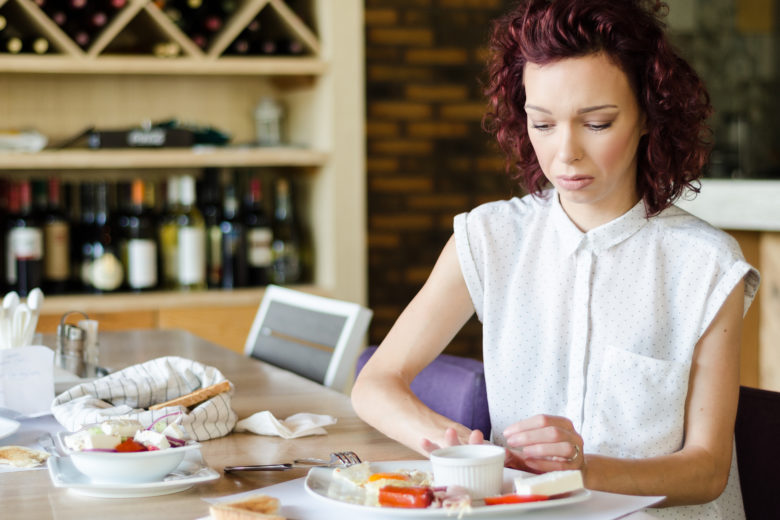
You sit down for a meal. You glance down and notice the plate before you: whole grains, plenty of bright colors, a good source of protein and healthy fat. You’re feeling pretty good about this meal and smile.
But then suddenly your stomach and throat tighten, your heart pounds faster and you feel faint. “What will happen if I eat anything on this plate?” your mind asks. “What if I eat everything on this plate?” ![]() You close your eyes, take one more deep breath and stand up shakily from the table and walk away in fear.
You close your eyes, take one more deep breath and stand up shakily from the table and walk away in fear.
Eating Disorder Plus Anxiety
For many of my clients who struggle with eating disorders and disordered eating, this scenario is a reality for mealtimes. They sit down with every intention to enjoy food and be present; yet, sometimes, all the best intentions are no match for an eating disorder mixed with anxiety. ![]() According to the National Institutes of Health, more than 40 million Americans suffer from anxiety related disorders.
According to the National Institutes of Health, more than 40 million Americans suffer from anxiety related disorders.
Anxiety is a natural human response that serves a purpose, and we shouldn’t aim to dismiss it. Instead, we should strike to make peace with it and learn to manage it. Even if you don’t suffer from an anxiety-related disorder, you’ve likely had a personal experience on some level.
We know that anxiety is part of the body’s stress response, also known as the “fight or flight” response. Once this response is triggered, your system is flooded with adrenaline and cortisol, which gives you super-charged perception, reflexes and speed in dangerous situations. But what about food that we are not allergic to? Why is the danger signal being tripped in the brain by perfectly safe foods? There are many theories among psychologists. “When working with someone with an eating disorder, the anxiety at mealtime or around food can stem from a multitude of things ranging from memories, social settings or an overwhelming situation,” says Bridget McCauley, a licensed professional counselor in Austin, Texas.
How RDNs Can Help
The registered dietitian nutritionist has many roles when working with clients who suffer from mental health issues, including building a positive relationship with food. In the scenario above, with a person who is struggling with anxiety around food, what can an RDN do to help?
In our office, we have a saying: “There is no such thing as a good, bad, right or wrong food. From cookies to kale, all foods fit to fuel your body and brain.” We also want to educate clients on the biochemistry of food and their brain to build trust. Sometimes we forget that not everyone trusts food. Building and creating trust and safety in food is the foundation for building positive relationships with food. I like to build trust by explaining the science of our bodies to bridge the gap between what we are saying and how they are feeling.
I begin talking about the value in consistent fuel throughout the day to regulate blood sugar, which in turn provides constant fuel and nutrition to the brain and central nervous system, which allows us to be more mindful when anxiety strikes. Without consuming carbohydrates throughout the day, our blood sugar drops and begins the cascade of warning signs. Then, after we’ve explored carbohydrates, we move on to the relationship between the vitamins and minerals in foods and anxiety, stress and depression.
Building trust, correcting any nutrient inadequacies and bridging the gap between food and knowledge helps to slowly move anxiety off the plate.



